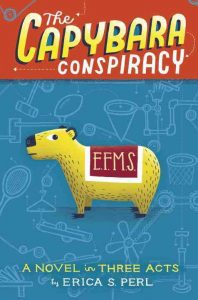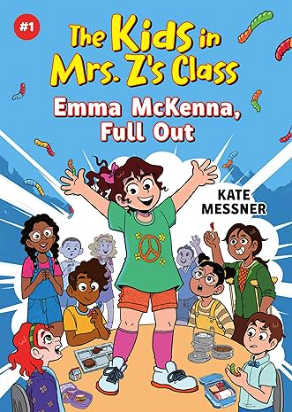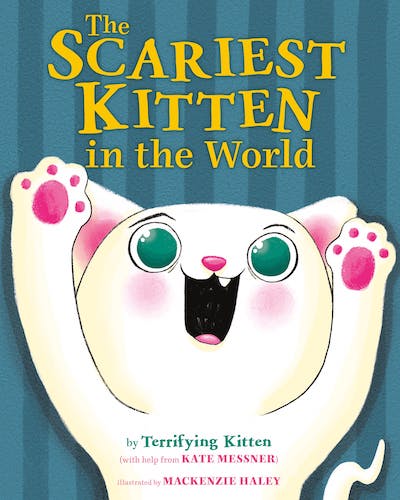It’s a Teachers-Write Friday, and that means it’s Friday Feedback day on Gae’s blog. Head on over to get some feedback on your work in progress and to offer help, too!
Also, Erica Perl, our guest author here today, has some revision tips to share! Erica is 3 of the 4 following things: 1) the author of picture books including Chicken Butt! and Goatilocks and the Three Bears; 2) the author of middle grade novels, including When Life Gives You O.J. and the forthcoming All Three Stooges; 3) the author of plays including The Capybara Conspiracy; 4) a hilarious public speaker; 5) terrible at math.


Six Reasons to Strip Down to Your Underwear and Read Your Work Aloud
An important piece of the editing process is reading your work out loud in your underwear. Not in front of an audience, mind you. But just to yourself (or, if you’d prefer, to supportive pets and houseplants). I find this to be an invaluable step, whether I am working on a picture book, an early reader, a play, a poem, or a novel.
Here are six reasons why you should do this:
1) Certain words or turns of phrase will trip you up, even though you’re the one who wrote them. This is particularly important in picture books or anything else that’s designed to be read aloud. If you stumble over it, chances are your reader will, too.
2) In a rhyming piece, you’ll also notice – most of the time – if your rhymes or meter are off. I say most of the time because you can actually force both things without intending to, so pieces that are written in rhyme require the additional step of having someone else read them aloud to you (you might want to put on a bathrobe for this). Ideally someone who has not heard you read this particular piece aloud before, so as not to be influenced by your patterns of inflection.
3) Your brain and your mouth will instinctively try to improve your work as you read. So, for example, if you used the word “kind” in a sentence you may find that you replace it aloud with the word “generous” if that’s really what you meant. Take note of this!
4) Your ear will notice which lines of dialog sound like the way people actually speak, and which sound “written” (the kiss of death, unless for some reason that is your intention).
5) You will discover how the rhythm of your piece works. For example, you’ll get a sense of which parts of your piece are too “talky” and need to be pulled back or balanced with more action, visual storytelling (in an illustrated book) or silence.
6) You will notice your bad habits, like specific words and phrases you lean on too hard, and you’ll discover excess words that you can part with. Half the battle of writing, in my opinion, is figuring out which words you don’t need.
With an audience of actual people (fully clothed, please!), you can of course discover many more things, like which of your jokes are actually funny and whether your plot makes any sense. But before you take that step, do your writing a favor: find a quiet place and read it out loud to yourself. And while the in-your-underwear component is optional, since you’re the only one there (except for the pets and houseplants), why not? Summer is the perfect time to shed clothes, and reading aloud is the perfect way to shed whatever’s holding your writing back.
After you do, leave a comment to share the most surprising thing you learned about your writing from trying this exercise!





Dear Erica,
Thanks for sharing your time and thoughts. I believe reading your work out loud is one of the best editing tools we have as writers. I started this practice a few years ago on a YA novel I was working on and found it really helpful. The scenes with dialogue especially lend themselves well to reading out loud. You know the tone you had in mind when you had the characters speaking but hearing those words spoken out loud is a great test to see if you’ve conveyed that tone properly.
Thanks again for the tips and best wishes on your writing, and yes, I read that outloud.
Excellent advice. When writing my first book I had a student read it. She said, “It’s good but it sounds like a teacher wrote it.” When I read it out loud I understood what she meant. Now I read all of my work out loud.
Actually, I have my computer read my PB mss aloud to me, Erica. BTW, I love CHICKEN BUTT. Also, in my online crit group, we read everything aloud – but the author never reads her own work. Very good revision tips. BTW, it’s 92 today in OH, so I may just be in my underwear! LOL
I do, too. I find it absolutely hysterical to listen to my computer cuss aloud to me and I actually do catch a lot of mistakes this way. Since my students all have a Chromebook, we do this in our classroom as well. They usually ask to get headphones or go into the hallway to listen to it.
Yes! Best tip! I’ve been a writer longer than I’ve been a librarian but being a librarian has taught me the importance of how well a story reads aloud. I’ve also used the voice recorder on my cell phone and then listened to the playback.
I have been a junior high ELA teacher for 15 years,and only 5 years ago, I realized that I was making a big mistake taking home my students’ writing to read. I thought, had that read this aloud, they’d hear what I am seeing (and I knew even if I wrote them a note about it that they’d likely ignore it). Now, during writing workshop time in class, students read their work aloud to me, peers, peer groups, to themselves (recording it and listening back). There’s always a list of revisions or edits they catch on their own, but the reaction of their audience and that feedback is always more useful in that live exchange. (AndI don’t take stacks of paper home to read anymore.)
For my own book — a YA verse novel that I am ready to share with the world — I spent my summer mornings and afternoons writing and my evenings reading it to my husband (a great listener and kind critic). There is a scene where my MC and a boy kiss. After I read that to my husband he said, “That sounds like us. I don’t know about this whole thing — too intimate, too real. How did you do that!” First, I was so glad he felt the intimacy, and second I said, “I wrote how I wish I had been kissed at 15, and I think teens need to know that it should/can feel safe and beautiful.”
I read him every poem in the short novel, looking for/hoping for similar reactions, but when he winced or furrowed his brow, I knew I had to adjust my phrasing.
I loved the experience of writing and then reading for/with my husband each day. Best summer ever.
Thank you, Erica! This is great advice. I always have students read their writing aloud to each other or me for these reasons. However, I have not been doing this for myself lately and I know I need to!
Thank you, Erica!
This morning, I made my way over to Gae’s Friday Feedback post to read the assignment, and then, I came to this blog. I loved your post. It put a smile on my face, which is difficult when you are getting ready for work while the rest of your family is sleeping in.:) Her Feedback assignment has to do with openings, so I decided to read the opening of my work-in-progress (chapter book) aloud to myself. I found not one, but two places where the descriptive details of the character didn’t flow. The details were fine, but the sentences were too choppy. After work, I plan to read what I worked on last night.
Thank you again.
Happy writing!
So many great tips already on the posts today! Erica, your clever and humorous recommendations for revision are steeped in solid advice, although I probably have to time the best sharing of the underwear imagery with middle schoolers.
Sarah, I’m also going to share your successful transition to more successful revision via reading aloud to ELA teachers I know. We often try something once or twice and then move on. Your commitment to recognizing the long term difference must be amazing to the student writers.
I like long novels, and you can tell that from my writing. This out loud strategy has worked for me more than once in recognizing convoluted sentence structure, too. You would think the visual would have been enough!
Thank you, Erica and TW Campers……I really enjoy the comment responses to your tips. One of the things that I don’t do enough is read my words aloud. I see the importance of what you are saying. I have a question for all….although it may seem silly:
When reading aloud. Do you fix/edit/ as you read….and then start from the top ? Or, do you just keep going? I ask because when I start from the top….I get kinda bored reading that part aloud over and over.
Like I said, it may seem silly….but aside from the tip of reading to my dog and cat in my undies (which will not impress them in the least) I wonder about other tips campers have.
I’ll chime in here. Everyone has a different process but personally, I stop and fix and then keep going. I do my writing in Scrivener now and use the speak feature, so I listen to the computer read it aloud to me. As soon as something sounds off, or I decide to change a word, I’ll do one of three things. 1. I fix the simple stuff right away 2. I highlight passages I want to return to after giving it more thought and 3. I make revision notes in a separate open Word doc. I don’t usually reread but will hit pause when needed. Sometimes, listening or reading aloud jogs my memory about a more hefty revision that want to do, like tightening up the plot or adding more character thoughts. My revision notes right now include weird stuff like: Mention that Laney puts on slippers before leaving the house and Show Laney ignoring Grant’s phone calls earlier.
This is something I constantly stress to my students….”Your writing can’t be read enough!”
Obviously they must remain clothed hahaha, but I think these are all valuable tips to pass on to my class.
Thank you for sharing! I look forward to another year of writing!
Good Morning Erica – thank you for your post today. Your six reasons list is extremely helpful!
When reading my writing aloud to my dog (but not in my underwear 🙂 I realize how I seem to keep changing my verb tense when I’m writing. It’s tricky for me to stay in one tense. Reading my work aloud makes that error blatantly stand out!
Luckily, I don’t have pets, so as long as other family members have left the house, and the shades are down, this is sound advice. Seeing as though I’m currently sitting inside a local Starbucks with a few colleagues, I will simply read the work aloud. That way I can venture into being courageous without the other baggage. I do find it helpful to read my work aloud, and often find word repetitions, or places where the flow is just “off”. Thank you for the great advice!
I have done this for years, although I usually wait until I’m finished with the third or fourth draft because then I’ve gotten most of the crappiest writing out of the way. (Or so I hope!) I do find it helpful to have a stash of tea bags and my boil pot nearby if I plan on making it a marathon read-aloud. It’s not until after my first read-aloud that anyone else sees the novel.
I like this idea. As of now, only one person has seen my writing (outside of what I’m sharing through this group) and we don’t live in the same country, so it’s hard to get that immediate feedback, and my hubby doesn’t like my style of writing (the content/genre) and is therefore reluctant to read it, so maybe my cats will enjoy it. Of course it’ll have to be during their nap time, or they won’t sit still long enough.
I think it would be hard to read aloud and not stop myself in the middle to make corrections, but to hold off on that until the second read-through.
Now you have me curious. What genre do you write?
I’m late to this post, but thank you, Erica, for sharing your tips. I like your take on how half of writing is figuring out which words you don’t need. I will definitely share your revision tips with my students.